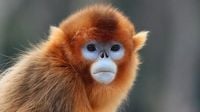In a historic moment for wildlife conservation and international relations, the ZooParc de Beauval in Saint-Aignan, France, unveiled three golden snub-nosed monkeys on May 7, 2025. This marks the first time these rare primates, on loan from China, have been displayed in a zoo outside Asia, making it a significant event for both the zoo and the species itself.
The golden snub-nosed monkeys, known scientifically as rhinopithecus roxellana, are celebrated for their striking appearance, featuring fiery red fur, blue faces, and uniquely upturned noses. They are considered "national treasures" in China, akin to the beloved giant pandas, due to their rarity and cultural significance. Rodolphe Delord, CEO of ZooParc de Beauval, expressed his excitement, stating, "It's incredible, but it's also a very great responsibility." This unveiling comes just over a month after the monkeys' arrival on April 3, during which they underwent a month-long quarantine to ensure their health and safety.
As the public gathered to witness this momentous occasion, anticipation filled the air. By 11 AM, a significant crowd had formed, eager to catch a glimpse of the monkeys. A select group of about a hundred annual pass holders had the privilege of an early viewing, followed by the general public, who arrived in droves. Visitors were astounded by the monkeys' beauty, with one young attendee, Lenny, 13, exclaiming, "They are very pretty. Their blue heads are different from other monkeys, and their golden fur adds to their charm."
Jean-Marc, an animal enthusiast who traveled back from his vacation in San Diego, USA, specifically for this event, shared his enthusiasm: "It's an exceptional moment. These are extraordinary monkeys. For me, who seeks rare animals, the golden monkey is a masterstroke. I couldn't dream of anything better." This sentiment was echoed by many in attendance, all eager to document the monkeys' debut with photos and videos.
During the official presentation, the zoo announced the names of the three monkeys, chosen through a public competition on social media. The two females were named Jindou, meaning "gold seed," and Jinhua, meaning "golden flower." The male was named Jinbao, which translates to "golden treasure." This naming ceremony added a personal touch to the event, further engaging the public and fostering a connection between the visitors and the animals.
The presence of these monkeys at the ZooParc de Beauval is part of a broader conservation and research initiative announced last November during a dinner between Chinese President Xi Jinping and French President Emmanuel Macron. This collaboration highlights the importance of international efforts in wildlife conservation, especially for endangered species like the golden snub-nosed monkey. The International Union for Conservation of Nature (IUCN) has classified these monkeys as "endangered" due to threats such as intensive agriculture, overtourism, and habitat destruction in their native China.
As part of their transition to their new home, two Chinese keepers and a veterinarian will remain at the zoo for three months, ensuring that the monkeys acclimate well to their environment. Cyrielle Lambert, an animal keeper at the zoo, shared her observations, stating, "The monkeys have acclimated very well; everything was fine within three days. The male is calmer than the females, who are very dynamic." This careful monitoring is crucial for the monkeys' well-being and future breeding efforts, as the zoo hopes to see them reproduce in the coming years.
The golden snub-nosed monkeys are housed in a specially designed "Chinese quarter" adjacent to the giant pandas, with features that replicate their natural habitat, including misting systems and air conditioning to maintain a comfortable environment. This thoughtful design underscores the zoo's commitment to animal welfare and conservation.
Visitors to the ZooParc de Beauval can look forward to seeing these magnificent creatures until 2035, providing ample opportunities to witness their unique behaviors and contribute to the ongoing efforts for their conservation. Julie, a visitor originally from Shanghai, expressed her excitement about the event, stating, "It's a great moment that strengthens Franco-Chinese friendship. I wanted to be a witness to this." Her sentiments reflect the broader significance of this event, which goes beyond mere entertainment and touches upon themes of cultural exchange and environmental stewardship.
As the world continues to grapple with biodiversity loss and the impacts of climate change, the arrival of the golden snub-nosed monkeys at ZooParc de Beauval serves as a reminder of the importance of conservation efforts. By fostering international partnerships and raising awareness about endangered species, zoos play a vital role in protecting our planet's wildlife for future generations.
In conclusion, the presentation of the golden snub-nosed monkeys is not just a celebration of a rare species but also a testament to the collaborative efforts between nations in wildlife conservation. As these monkeys settle into their new home, they will undoubtedly capture the hearts of many and inspire further action to protect their endangered counterparts.


